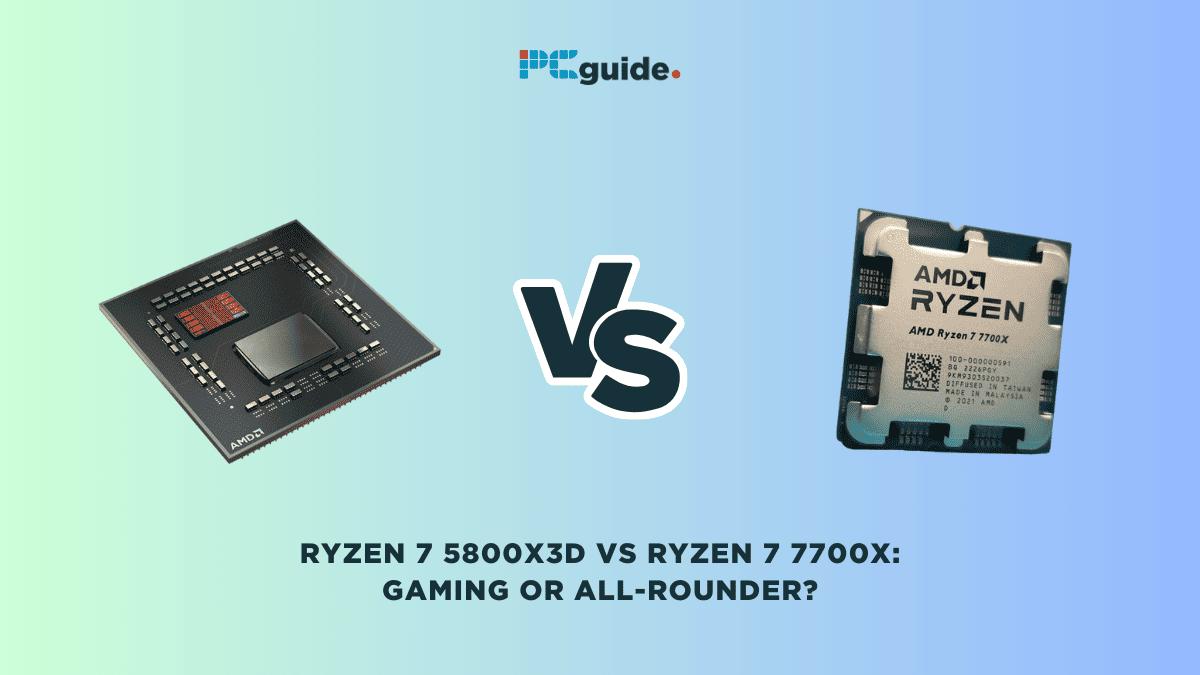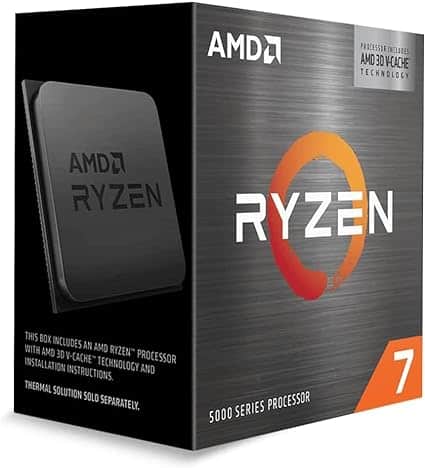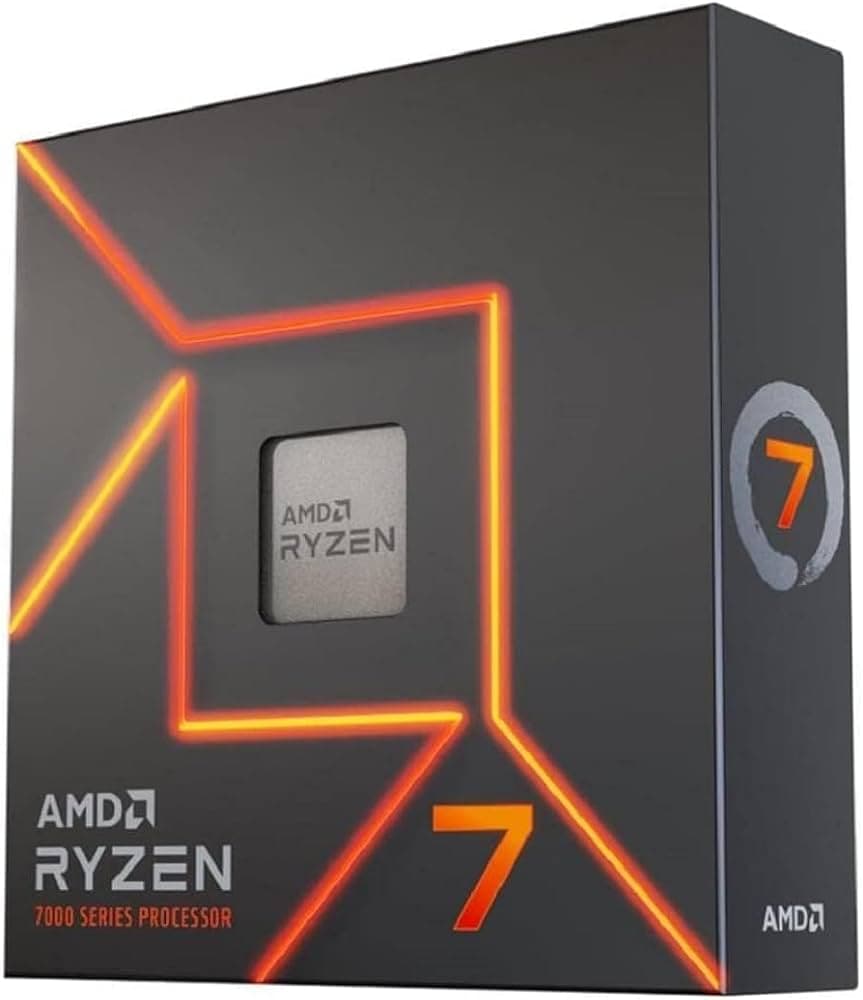Ryzen 7 5800X3D vs Ryzen 7 7700X: Gaming or all-rounder?

Table of Contents
The matchup of Ryzen 7 5800X3D vs. Ryzen 7 7700X presents a fascinating comparison for enthusiasts and average users alike. This article aims to dissect the nuances of these two mid-range powerhouses, providing insights into which might be the better fit for your computing needs.
The Ryzen 7 5800X3D is part of AMD’s Ryzen 5000 series, notable for its enhanced gaming capabilities thanks to the innovative 3D V-Cache technology. On the other hand, the Ryzen 7 7700X, a more recent offering from AMD's Zen 4 generation, brings forward the advancements of newer technology.
Prime Day is finally here! Find all the biggest tech and PC deals below.
- Sapphire 11348-03-20G Pulse AMD Radeon™ RX 9070 XT Was $779 Now $739
- AMD Ryzen 7 7800X3D 8-Core, 16-Thread Desktop Processor Was $449 Now $341
- ASUS RTX™ 5060 OC Edition Graphics Card Was $379 Now $339
- LG 77-Inch Class OLED evo AI 4K C5 Series Smart TV Was $3,696 Now $2,796
- Intel® Core™ i7-14700K New Gaming Desktop Was $320.99 Now $274
- Lexar 2TB NM1090 w/HeatSink SSD PCIe Gen5x4 NVMe M.2 Was $281.97 Now $214.98
- Apple Watch Series 10 GPS + Cellular 42mm case Smartwatch Was $499.99 Now $379.99
- ASUS ROG Strix G16 (2025) 16" FHD, RTX 5060 gaming laptop Was $1,499.99 Now $1,274.99
- Apple iPad mini (A17 Pro): Apple Intelligence Was $499.99 Now $379.99
*Prices and savings subject to change. Click through to get the current prices.
Ryzen 7 5800X3D vs Ryzen 7 7700X: Specs
Both CPUs share the same core and thread count, featuring 8 cores and 16 threads, a setup that has become a sweet spot for both gaming and productivity tasks. However, the similarities largely end there, as these processors diverge notably in their base and boost clock speeds.
The Ryzen 7 5800X3D operates at a base clock of 3.4 GHz and can boost up to 4.5 GHz. In contrast, the Ryzen 7 7700X pushes the boundaries further with a higher base clock of 4.5 GHz and an impressive boost clock of 5.4 GHz. This increase in clock speed suggests that the 7700X could offer faster performance in scenarios where higher clock speeds are leveraged.
| Specs | Ryzen 7 5800X3D | Ryzen 7 7700X |
|---|---|---|
| Cores/Threads | 8/16 | 8/16 |
| Base Clock | 3.4 GHz | 4.5 GHz |
| Boost Clock | 4.5 GHz | 5.4 GHz |
| Lithography | 7 nm TSMC | 5 nm TSMC |
| TDP | 105W | 105W |
| Cache L3 | 96 MB | 32 MB |
| MSRP | $449 | $399 |
Another critical difference lies in their cache sizes, particularly the L3 cache. The Ryzen 7 5800X3D boasts a substantial 96 MB of L3 cache, thanks to AMD’s 3D V-Cache technology, which is a significant leap over typical cache sizes and is geared towards enhancing gaming performance.
Meanwhile, the Ryzen 7 7700X offers a more standard 32 MB of L3 cache. While this is ample for most tasks, it doesn’t quite match the large cache reservoir of the 5800X3D, which can be particularly beneficial in reducing latency for certain workloads.
Ryzen 7 5800X3D vs Ryzen 7 7700X: Performance
Comparing the AMD Ryzen 7 5800X3D and the Ryzen 7 7700X reveals significant distinctions in performance, power efficiency, and application suitability.
Zen 4 advancements in the Ryzen 7 7700X
The Ryzen 7 7700X, built on AMD’s Zen 4 architecture, marks a substantial leap forward. It achieves a 13% increase in instructions per cycle (IPC) and a peak frequency of 5.7 GHz. This improvement translates to a 29% uplift in single-core performance over the Ryzen 5000 series. The Ryzen 7 7700X excels in deep learning and AI applications, thanks to AVX-512 with VNNI support, enhancing FP32 compute performance and Int8 operations notably.
Gaming and graphics performance
In gaming, particularly at 1080p resolutions, the Ryzen 7 5800X3D holds its own against the 7700X. Benchmarks indicate that in graphics-intensive titles, such as Far Cry 6, the 5800X3D occasionally outperforms the 7700X, owing to its larger L3 cache. This aspect makes the 5800X3D a strong contender for gamers prioritizing high frame rates.
Productivity and hardware utilization
When it comes to productivity, the Ryzen 7 7700X demonstrates superior performance. Its advanced architecture, coupled with higher base frequency and precision boost capabilities, makes it more adept at handling diverse workloads, from content creation to complex computational tasks. This edge is further augmented by its compatibility with faster RAM, enhancing overall hardware synergy.
Power efficiency and consumption
The 7700X, while powerful, tends to exceed its 105W TDP under heavy loads, leading to higher power consumption. In contrast, the Ryzen 7 5800X3D shows better power management, staying within its power envelope. This difference is crucial for users considering the overall energy efficiency of their system.
Which CPU is better for gaming with an integrated graphics processing unit (iGPU)?
If you’re using an iGPU, both CPUs will provide adequate performance for basic gaming. However, the Ryzen 7 5800X3D’s larger L3 cache may give it a slight edge in some gaming scenarios.
Ryzen 7 5800X3D vs Ryzen 7 7700X: Price
The pricing landscape for the Ryzen 7 5800X3D and Ryzen 7 7700X has evolved since their respective launches, with a notable difference now evident. Originally debuting with just a $50 gap, the Ryzen 7 5800X3D has seen a price reduction to around $349, making it more affordable than its initial offering. In contrast, the Ryzen 7 7700X maintains its position at approximately $400.
This price differential is significant for buyers balancing performance needs with budget constraints. The lower price of the 5800X3D might appeal more to budget-conscious users, especially given its competitive performance in gaming.
However, the total cost of ownership extends beyond the CPU’s price tag. Platform costs for the Ryzen 7000 series, including the Ryzen 7 7700X, are higher due to the requirement for newer, often pricier, 600 series chipset motherboards and DDR5 memory.
Which CPU offers better value for money, the Ryzen 7 5800X3D or the Ryzen 7 7700X?
AThe value proposition of each CPU depends on your primary usage scenarios. If you’re primarily a gamer, the Ryzen 7 5800X3D is a better value, offering exceptional gaming performance at a more affordable price compared to the Ryzen 7 7700X.
However, if you’re a power user who demands high performance across various tasks, including gaming, productivity, and specialized applications, the Ryzen 7 7700X is a better choice, albeit at a higher cost.
Ryzen 7 5800X3D vs Ryzen 7 7700x: Conclusion
In conclusion, the Ryzen 7 5800X3D and Ryzen 7 7700X cater to different user needs and preferences, each excelling in distinct areas. The Ryzen 7 5800X3D, with its reduced price point, offers excellent value, particularly for gamers. Its gaming performance is robust, especially in high-resolution settings, making it an ideal choice for users who prioritize gaming above all else.
On the other hand, the Ryzen 7 7700X shines in general computing and productivity tasks, thanks to its higher clock speeds and the improvements brought by the Zen 4 architecture.
The advancements in IPC and support for DDR5 memory, along with its better single-threaded performance, make it a more suitable option for users who need a CPU for intensive workloads, deep learning applications, and modern computational tasks.


